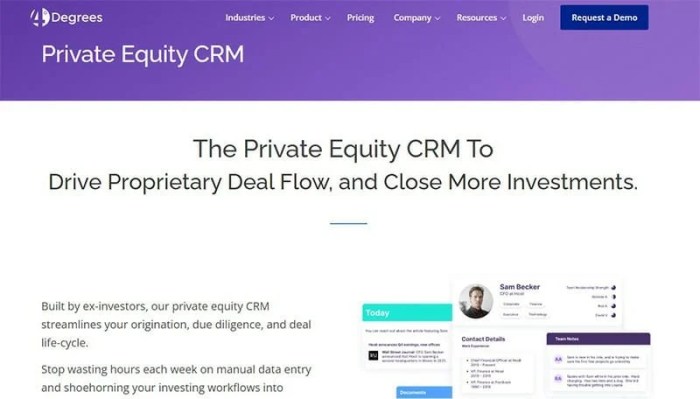The private equity (PE) industry is a demanding landscape, characterized by complex deal flows, intricate investor relationships, and a constant need for meticulous data management. Successfully navigating this environment requires robust and efficient tools, and at the forefront of these necessities is a sophisticated Customer Relationship Management (CRM) system. This article delves deep into the world of private equity CRM software, exploring its features, benefits, selection criteria, and frequently asked questions.
Understanding the Needs of Private Equity Firms
Private equity firms have unique requirements that go beyond the capabilities of standard CRM solutions. They need software that can handle:
- Complex Deal Management: Tracking multiple deals simultaneously, managing due diligence, and monitoring key performance indicators (KPIs) across various stages.
- Investor Relationship Management (IRM): Maintaining detailed records of investor interactions, preferences, and performance expectations. This includes managing communications, reporting, and capital calls.
- Portfolio Company Management: Monitoring the performance of portfolio companies, tracking key metrics, and facilitating communication between the PE firm and its portfolio companies.
- Secure Data Storage and Access Control: Protecting sensitive financial and investor data through robust security measures and granular access controls.
- Reporting and Analytics: Generating comprehensive reports on deal flow, investor performance, and portfolio company metrics to support strategic decision-making.
- Integration with other systems: Seamless integration with financial systems, email platforms, and other critical business applications.
Key Features of Private Equity CRM Software
A comprehensive private equity CRM should incorporate the following key features:

Source: founderjar.com
Deal Management Capabilities, Private equity crm software
- Deal Pipeline Management: Visual representation of the deal pipeline, allowing for easy tracking of deals at various stages.
- Due Diligence Tracking: Centralized repository for due diligence documents and progress tracking.
- Valuation Modeling: Integration with valuation models to facilitate deal analysis and decision-making.
- Automated Workflows: Streamlining repetitive tasks such as email notifications and document management.
Investor Relationship Management (IRM) Tools
- 360° Investor View: A consolidated view of all interactions and communications with each investor.
- Capital Call Management: Efficient management of capital calls and investor contributions.
- Performance Reporting: Automated generation of customized performance reports for investors.
- Communication Management: Secure communication channels for confidential information exchange.
Portfolio Company Management Features
- Performance Tracking: Monitoring key performance indicators (KPIs) of portfolio companies.
- Financial Reporting: Access to real-time financial data from portfolio companies.
- Communication and Collaboration Tools: Facilitating communication and collaboration between the PE firm and its portfolio companies.
Reporting and Analytics
- Customizable Dashboards: Providing real-time insights into key metrics and performance indicators.
- Advanced Reporting Capabilities: Generating comprehensive reports on deal flow, investor performance, and portfolio company metrics.
- Data Visualization Tools: Presenting data in an easily understandable and actionable format.
Selecting the Right Private Equity CRM Software
Choosing the right private equity CRM requires careful consideration of several factors:

Source: softwareglimpse.com
- Scalability: The software should be able to handle the firm’s current and future needs.
- Integration Capabilities: Seamless integration with existing financial systems and other business applications.
- Security: Robust security measures to protect sensitive data.
- User-Friendliness: Intuitive interface that is easy for all users to navigate.
- Customization Options: Ability to tailor the software to the firm’s specific needs.
- Vendor Support: Reliable vendor support and maintenance services.
- Cost: Balancing functionality and cost-effectiveness.
Top Private Equity CRM Software Solutions (Examples – Note: This is not an exhaustive list and market conditions change rapidly. Always conduct independent research.)
Several vendors offer specialized CRM solutions for private equity firms. Researching specific features and comparing pricing is crucial. Some examples include (but are not limited to) solutions from companies specializing in financial software and CRM platforms that offer strong customization options. Always check for recent reviews and comparisons before making a decision.
Frequently Asked Questions (FAQs)
- Q: What are the benefits of using a private equity CRM?
A: Improved deal flow management, enhanced investor relationships, better portfolio company oversight, streamlined reporting, and reduced operational costs.
- Q: How much does private equity CRM software cost?
A: Pricing varies significantly depending on the features, scalability, and vendor. Expect a range from several hundred to thousands of dollars per month or per user, potentially with additional costs for implementation and customization.
- Q: Can a private equity CRM integrate with my existing systems?
A: Many private equity CRMs offer integration capabilities with various financial systems, email platforms, and other business applications. This should be a key consideration during the selection process.
- Q: What security measures should I look for in a private equity CRM?
A: Look for features such as data encryption, access controls, audit trails, and compliance with relevant security standards (e.g., SOC 2).
- Q: How long does it take to implement a private equity CRM?
A: Implementation time varies depending on the complexity of the software and the firm’s specific needs. It can range from a few weeks to several months.
Conclusion: Private Equity Crm Software
Implementing a robust private equity CRM is a strategic investment that can significantly improve efficiency, enhance decision-making, and drive better returns. By carefully considering the features, selecting the right vendor, and prioritizing security and integration, private equity firms can leverage technology to gain a competitive edge in today’s dynamic market.
Call to Action
Ready to optimize your firm’s operations and unlock the full potential of your investments? Contact us today for a consultation to discuss your specific needs and explore the best private equity CRM solutions for your firm.
FAQ Explained
What are the key features of private equity CRM software?
Key features include contact management, deal tracking, due diligence management, portfolio company monitoring, reporting and analytics, and investor relationship management.
How much does private equity CRM software cost?
Pricing varies significantly based on the vendor, features included, and the number of users. Expect a range from several hundred to thousands of dollars per month.
What are the integration capabilities of these systems?
Many systems integrate with other business applications, such as financial modeling software, accounting systems, and email platforms, creating a seamless workflow.
How can private equity firms choose the right software?
Firms should assess their specific needs and requirements, compare features and pricing from different vendors, and consider factors like scalability, security, and user-friendliness.
